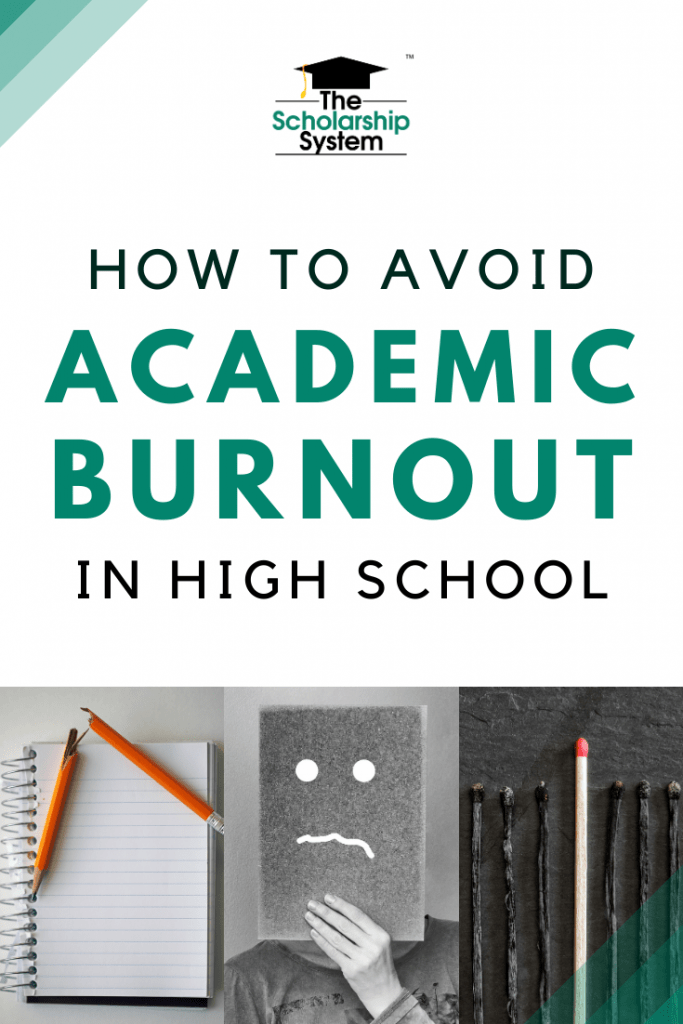Updated on November 12th, 2023
Academic burnout is a surprisingly common problem, especially among high school seniors. Juggling schoolwork, college applications, scholarships, extracurricular activities, graduation preparations, and everything else is daunting. At times, it may even be too much to bear.
Is your student burning out when trying to find college scholarships? If so, we can help! If you and your student want to learn more about scholarship opportunities, including how to efficiently find them and apply, sign up for our free college scholarship webinar! Take a trip over to http://thescholarshipsystem.com/freewebinar to secure your spot today.
Luckily, avoiding or overcoming academic burnout and finishing high school strong is possible. If you’re worried your student is struggling or feels overwhelmed, here’s what you need to know.
Contents
- 1 What Is Academic Burnout?
- 2 Symptoms of Burnout
- 3 How to Avoid – and Recover from – Academic Burnout
- 3.1 Put Activities on Pause
- 3.2 Make Time for Rest
- 3.3 Set Priorities and Reasonable Goals
- 3.4 Schedule Outdoor Time
- 3.5 Avoid Procrastination
- 3.6 Make Time for Sleep
- 3.7 Focus on Good Nutrition
- 3.8 Work with Your Guidance Counselor
- 3.9 Get Help from Professionals
- 3.10 Bonus Tip for Parents: Practice Empathy
- 4 How Parents Can Protect Themselves from High School Senior Year Burnout
What Is Academic Burnout?
In the simplest sense, burnout is a negative physical, mental, and emotional state that arises in response to stress. While it’s traditionally associated with working professionals, it can impact anyone participating in specific activities.
With academic burnout among high school students, the main stressors tend to be those related to schooling. This can include attending classes, handling homework, taking standardized tests, and similar activities.
At times, academic burnout also extends into other parts of the high school experience. For example, extracurricular activities and certain social aspects of being a high schooler may fall into this category.
Regardless of the precise cause, burnout in students tends to lead to mental and emotional fatigue or exhaustion. For anyone, prolonged stress tends to be damaging, negatively impacting motivation, concentration, sleep quality, and more.
School burnout can also affect physical well-being. Fatigue, tiredness, headaches, upset stomachs, and shifts in appetite may all occur.
At times, the implications of burnout are broad, affecting a person’s entire life. In others, the ramifications are more focused, limited mainly to the activities that are the source of stress.
Symptoms of Burnout
The symptoms of burnout can be surprisingly varied. In some cases, there are physical symptoms. In nearly all cases, there are mental and emotional symptoms. However, the symptoms are always disruptive, impacting the student’s academic life, at a minimum, and potentially harming other aspects of their lives as well.
Here is an overview of some of the common symptoms of academic burnout in students:
- Feelings of depression or anxiety
- Frequent or chronic insomnia
- Frequent headaches or increased pain due to tension
- Nausea or other digestive distress
- Irritability, frustration, or hostility
- Fatigue, exhaustion, and tiredness
- Diminishing motivation
- Falling academic performance
- Reduced confidence in one’s academic abilities or decline in self-esteem
- Increased absences from school
- Lack of interest in once enjoyable activities
- Increased reliance on bad habits as stress relievers
- Inability to focus at school, home, or work
- Self-destructive or self-harm behavior
- Withdrawing from family members and friends
There can be other symptoms and signs of burnout as well. Every person is unique, so reactions to stress and burnout can vary. However, those above can serve as a starting point, allowing you to keep an eye out for potential warning signs in your student.
Taking any burnout symptoms you or your student spot seriously is essential. Ignoring the issue will typically make it worse, increasing the odds of poor outcomes and bigger struggles. In contrast, early action can make burnout easier to avoid or recover from, ensuring a difficult situation doesn’t evolve into something catastrophic.
If your student is considering self-harm, is suicidal, or is exhibiting other warning signs of a mental health crisis, contact a medical professional immediately. Stress – including high school burnout – can be a precursor to serious conditions or may exacerbate an existing condition. However, with proper treatment, medical health conditions are often manageable. Don’t delay if your student is struggling; quick action can make all the difference.
For immediate support, 988 Lifeline is an excellent resource. Callers can receive confidential help for themselves or situations involving loved ones through this national network 24/7, and the website has convenient informational resources for additional guidance on various issues.
How to Avoid – and Recover from – Academic Burnout
Avoiding or recovering from high school burnout means your student must learn to keep themselves metered and balanced. Life shouldn’t be all about schoolwork, for one. For another, everyone has energy limits, and concentrating too heavily on academics means not having enough time for enjoyable and rejuvenating activities, which is why time management skills are important.
Here is a breakdown of steps students can take to recover from or avoid academic burnout.
Put Activities on Pause
The first move students should make is to take a step back by putting as many activities on a temporary pause as possible. That way, they can assess their situation without being in the middle of it.
Essentially, the pause gives students room to breathe. Plus, it ensures that they have more time available to handle tasks that need to continue, which can make those feel less burdensome.
Make Time for Rest
Parents need to make sure that their students aren’t overtasked, so encourage your student to carve time out of their schedule for themselves to rest. Trying to squeeze in too many activities for a long period sets the stage for burnout later, as they don’t have enough time available for relaxation. By formally scheduling breaks, it’s easier for students to maintain balance.
Set Priorities and Reasonable Goals
Help your student set priorities and reasonable goals. Then, make sure your student aligns their activities with those priorities. If a current obligation doesn’t support that picture and isn’t genuinely necessary, setting it aside may make it easier to avoid or combat burnout.
Schedule Outdoor Time
Research shows that spending time outside in nature can reduce stress and anxiety, boost a person’s mood, and promote well-being. Since that’s the case, try to ensure your student gets to spend some time outdoors.
During COVID-19, most people were stuck in their own homes, rarely leaving. Conditions like that can compound academic burnout, making trying situations harder to navigate. Physical exercise, like a short walk outside each day, can be a simple yet surprisingly effective solution.
Avoid Procrastination
Procrastinating typically leads to heightened stress. When students wait until the last minute to handle a task, the situation comes with far more pressure than they’d experience if they didn’t delay.
Encourage students to plan for their upcoming activities effectively by using time management best practices. For example, they can carve out small amounts of time each day for studying or break down large homework activities into a series of small steps, letting them handle one phase at a time over a series of days or weeks. Those approaches can dramatically reduce the associated pressure and allow students to avoid the panic that typically comes with waiting until the last moment.
Make Time for Sleep
Generally, teens need between 8 and 10 hours of sleep each night to feel rested and ready to tackle the day ahead. Whether they’re struggling with burnout or trying to avoid it, it’s always wise for your student to focus on getting enough sleep.
A lack of sleep can make stress more difficult to manage, making it harder to avoid burnout or overcome it. Failing to get enough shuteye can harm cognitive performance, attention span, memory, and more.
Ideally, students should develop a sleep routine that includes heading to bed and waking up at the same time each day. Adopting healthy sleep habits like avoiding electronic devices a few hours before bed and skipping caffeine in the evening can also help.
Focus on Good Nutrition
When it comes to battling academic burnout, good nutrition is important, as it ensures the body has what it needs to thrive. A balanced diet boosts the immune system and can make the body and mind more resilient in the face of stress.
Work with Your Guidance Counselor
Struggling high school students often have access to a critical point of support: their guidance counselor. Along with helping them set reasonable goals, guidance counselors may be able to help students adjust their class load if their current one is doing more harm than good. Plus, guidance counselors may know of various resources that can assist students battling burnout.
Get Help from Professionals
If your student is experiencing a mental health crisis, contact a medical professional immediately. They can assist your student by creating customized treatment plans, sharing coping techniques, and otherwise helping them manage their condition and move forward.
Bonus Tip for Parents: Practice Empathy
If your student is battling back from academic burnout, be supportive, empathetic, and understanding. Walking on the road to recovery takes time, and your student may need additional support as they regain their footing.
Ultimately, avoiding and recovering from student burnout is all about achieving balance. Just like professionals strive for work-life balance, students need academic-life balance, too. That way, they can have fulfilling lives, reduce stress, have healthy habits, and ensure they are ready for the challenges of today, tomorrow, and the future.
How Parents Can Protect Themselves from High School Senior Year Burnout
Can parents experience high school senior-year burnout? Yes, they can.
Many parents play a big role in helping their students finish high school strong and prepare for college, and just like students, they can struggle with the stress that comes with it.
Parents have to shoulder the stress of a child potentially leaving home for college. That’s a big transition that can be exciting and scary. Couple that with the stress of running a household, working in a job, and other life demands and burnout can certainly happen.
Like students, parents should also take steps to maintain their mental health. Carving out some personal time is a big step, as it allows you to participate in activities you enjoy.
Additionally, managing your expectations – both those you place on yourself and those you put on your student – is essential. If your goals aren’t realistic, they’ll simply be a source of strife, increasing your stress levels and making challenging situations harder. Plus, having unrealistic expectations of your student can make school more stressful for them and lead to arguments or resentment, harming your relationship with them.
Remember, not only should you be supportive of your student, but you should also be kind to yourself. After all, you can’t help anyone if you’re struggling. That’s why taking care of yourself is so vital, ensuring that you’re in the best shape possible and have the focus, energy, and motivation to help your student thrive.
Is your student burning out when trying to find college scholarships? If so, we can help! If you and your student want to learn more about scholarship opportunities, including how to efficiently find them and apply, sign up for our free college scholarship webinar! Take a trip over to http://thescholarshipsystem.com/freewebinar to secure your spot today.








Leave a Reply